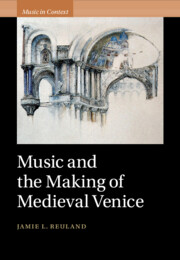Book contents
- Music and the Making of Medieval Venice
- Music in Context
- Music and the Making of Medieval Venice
- Copyright page
- Dedication
- Contents
- Figures
- Maps
- Tables
- Music Examples
- Acknowledgments
- Manuscript Sigla
- A Note on Dating
- Abbreviations
- Introduction
- Part I An Audible Empire
- Part II The Fictive City
- Part III Relics and the Horizons of Musical Representation
- 4 Narrative Fragments
- 5 History Lessons
- 6 Sound Documents
- Epilogue
- Book part
- Bibliography
- Index
Epilogue
from Part III - Relics and the Horizons of Musical Representation
Published online by Cambridge University Press: 12 October 2023
- Music and the Making of Medieval Venice
- Music in Context
- Music and the Making of Medieval Venice
- Copyright page
- Dedication
- Contents
- Figures
- Maps
- Tables
- Music Examples
- Acknowledgments
- Manuscript Sigla
- A Note on Dating
- Abbreviations
- Introduction
- Part I An Audible Empire
- Part II The Fictive City
- Part III Relics and the Horizons of Musical Representation
- 4 Narrative Fragments
- 5 History Lessons
- 6 Sound Documents
- Epilogue
- Book part
- Bibliography
- Index
Summary
Sometime a citizen of the lagoon city, Francesco Petrarch carried on an uneasy affair with Venice. Benintendi Ravignani, whose death ended Chapter 6, had enticed the poet to join him in the city, and had brokered an arrangement with the Venetian Senate where, in exchange for residency in the Palazzo Molina, Petrarch would donate his personal library to the state. Petrarch spent a full six years at the Palazzo Molina (1362–68), enjoying every imaginable protection for himself and his family, but he seems to have had little stomach for the dazzling carcass of a city. In a snub to the Senate that hosted him, he left Venice permanently in 1368 for nearby Arquà, at that time ruled by the Republic’s Carrarese enemies. His hugely successful De remediis utriusque fortunae (Remedies against fortune), however, cited in the epigram above, had been composed during that Venetian period.
- Type
- Chapter
- Information
- Music and the Making of Medieval Venice , pp. 230 - 236Publisher: Cambridge University PressPrint publication year: 2023

